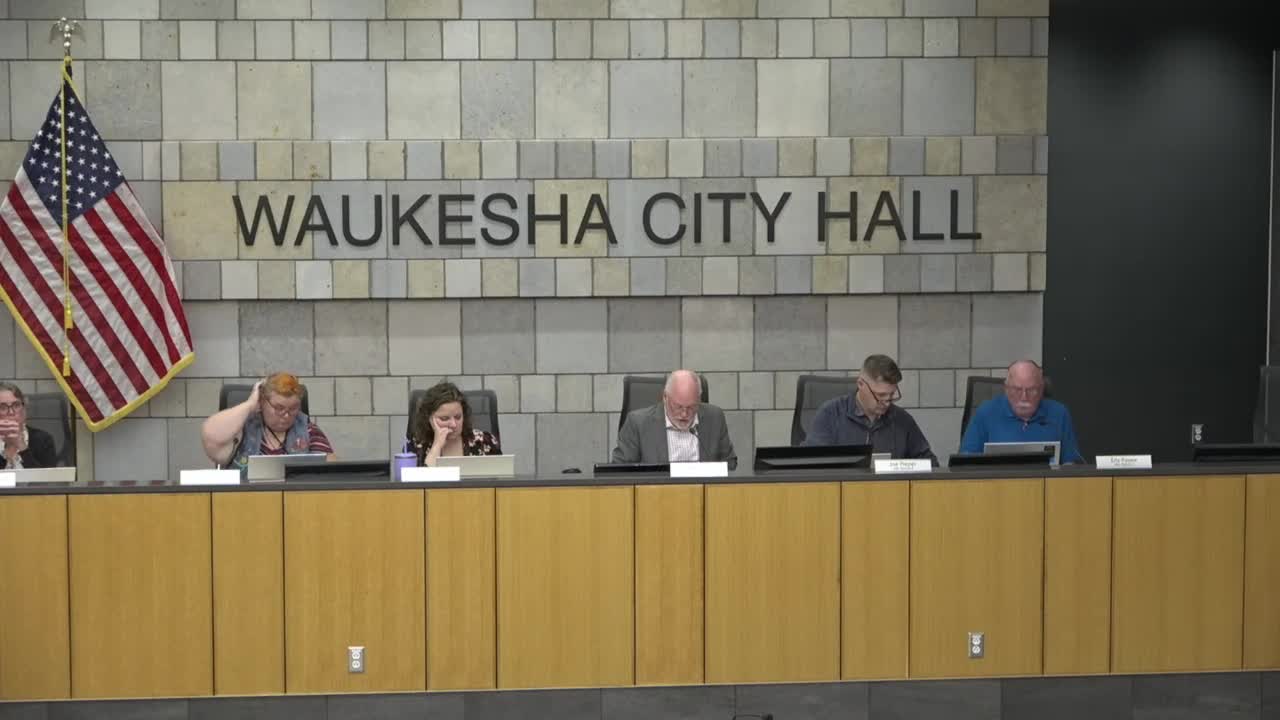Waukesha council adopts $160 annual residential garbage, recycling fee after 9-5 vote
Get AI-powered insights, summaries, and transcripts
Subscribe
Summary
The Waukesha Common Council adopted a resolution creating a $160 annual fee for residential garbage and recycling collection, moving the service from the general fund into a dedicated special revenue fund; the measure passed 9-5 after public comment and council debate.
The Waukesha Common Council voted 9-5 Tuesday to adopt a resolution creating an annual $160 fee for residential garbage and recyclables collection, shifting funding for the service from the city’s general fund into a dedicated special revenue fund. The council also set an initial due date of Nov. 7 for the first year’s bill and instructed staff to publish notice of the fee.
City Administrator Tony Brown and Finance Director Joe Sherrill framed the proposal as a structural fix to projected future deficits. "We would be reducing the tax the property tax levy by $2,000,000," City Administrator Tony Brown said, summarizing how the change would appear on the ledger. Finance Director Joe Sherrill said the city’s five-year projection showed mounting structural deficits and that the fee helps close the gap; he told the council the projection showed the city would “project being at a net loss of $5,100,000 by 2029” under the status quo.
Why it matters: Brown and Sherrill told council members the fee is intended to protect core services — including public safety — by removing an unpredictable and rising garbage cost from the general fund. The fee pays for automated and manual collection under the city’s contract with a private hauler and will be set annually by council resolution. The initial resolution sets the fee at $160 per city-issued garbage cart (or $160 per address for manual service), the city attorney’s office said.
Public comment was heavily weighted against the proposal but included some support. Mike Walsh, a resident who spoke during public comment, called the move “a shell game.” Adele Vogel, a small landlord, said the fee will “force[] me to pass that cost on to my tenants.” Conversely, resident Carly Proust, writing to an alderman, said her building already has private service and supported the fee because those tenants would not be double-charged.
Council debate covered alternatives and consequences. Several aldermen said they opposed cutting police or fire and described levy limits and declining net new construction as constraints on local revenues. Alderman Eric Payne questioned whether large-item pickup would be covered; staff said the $160 figure as proposed does not include an expanded large-item program but that the price could be adjusted to add services if council so directs.
How it will work: The resolution requires the city to publish notice of the fee no later than 21 days before the due date. Payments not made by the due date will be added to the property tax bill as a special charge. The city attorney explained the $160 fee equates to about $13.33 per month and said the council must reduce the levy by an amount tied to the fee under state levy-limit law. Staff told council that the contract with the hauler allows up to a 3% annual increase by the vendor; the city would adjust the fee to preserve a break-even position in the special revenue fund.
Next steps and implementation: The council adopted the resolution 9-5. Staff will publish the notice and implement billing; unpaid fees will be rolled onto property tax bills per the resolution. Councilmembers and staff also proposed community workshops and legislative advocacy to pursue broader changes to state revenue-sharing and levy-limit rules.
Details: Annual household fee: $160; equivalent monthly amount: $13.33; estimated net additional impact on an average $350,000 single-family home after levy reduction: $49 (estimate provided by staff); initial due date (2025): Nov. 7; vendor contract allows up to 3% annual price increase.
